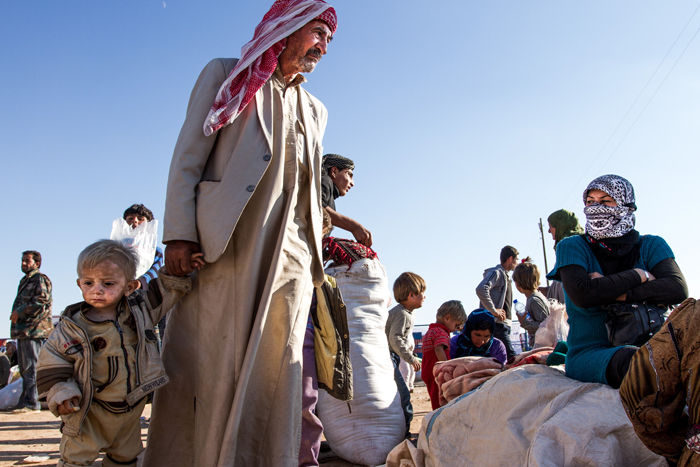European refugee crisis escalates to new heights
Refugees from Kobanî, Syria, flee to Turkey to escape IS attacks in September 2014. Nearly 2.5 million Syrian refugees have already fled to Turkey.
February 10, 2016
The European Union’s (EU) foreign policy chief urged Turkey to open borders to thousands of incoming refugees at the Turkey-Greece border on Sunday.
As if the situation could not get more out of hand, Süleyman Tapsiz, the governor of the Turkish province of Kilis, estimated that 35,000 refugees remain waiting outside Turkey’s border in their long journey to reach the safety and comfort of Western Europe.
Currently, Turkey hosts nearly 2.5 million Syrian refugees, which is more than some of the Western European countries which had committed to receiving fleeing migrants and solving the refugee crisis.
Turkey is also receiving $3.3 billion from the EU to help stop the flow of refugees, according to an article published Monday in Al Jazeera, but the conflict between the European countries will not end.
If the focus was on Germany after the New Year’s assaults, which drastically changed the opinion of many German citizens on the matter, now the focus is on Turkey.
The refugees amassing at its border, as well as the fact that 33 refugees reportedly drowned off the coast of Turkey on their way to a Greek island, has thrust the country back into the spotlight.
The incident happened on the same day that German Chancellor Angela Merkel agreed with Turkish President Recep Tayyip Erdoğan on guidelines to assist the Syrian refugee situation.
Unfortunately, these drownings have become almost routine, to the extent that the media does not heavily cover such incidents, and as a result the public is often left indifferent.
Currently, a solution is unclear, but it should not involve blame or force.
The sudden influx of refugee migrants is in part due to the Russian bombings of Syria in their alleged quest to stop the Islamic State (IS).
The irony in all this is that the EU is demanding Turkey opens its borders to the migrants, while at the same time requesting stricter border controls.
In that same article, Al Jazeera reported that an additional 70,000 migrants might make their way to Turkey if the Russian airstrikes and Assad’s regime continue to cause chaos in Syria. IS is by far not the only reason Syrian migrants are fleeing.
While Turkey has promised to assist the crowds at the border, they still have not opened their borders.
Erdoğan said that if necessary, Turkey would open its borders, but more recently stated that “Turkey is under threat.”
Turkey and Germany are not the only countries in desperate situations, but the solution to solving this is not pressuring or forcing a country to act in a certain way.
While the countries have been busy disputing and pointing fingers, a meeting or summit has not yet been assembled, while refugees continue to perish in the Mediterranean Sea.
The migrant situation seems to be more than the countries claimed to be able to handle, and, in any case, a plan to rethink the crisis is in order.

















